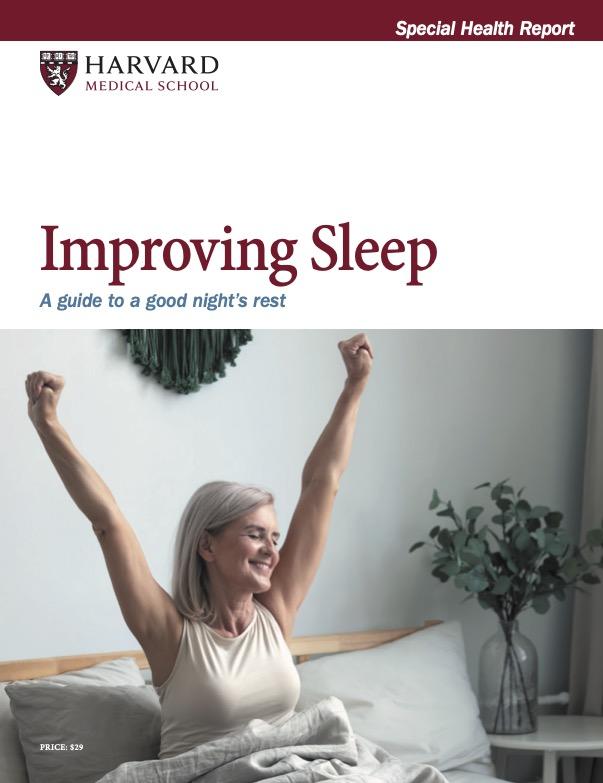The many dimensions of a good night’s sleep
Getting enough sleep is essential for cardiovascular health. But the quality, timing, and regularity of your slumber also matters.
- Reviewed by Christopher P. Cannon, MD, Editor in Chief, Harvard Heart Letter; Editorial Advisory Board Member, Harvard Health Publishing

Getting a sufficient amount of sleep is so vital that the American Heart Association (AHA) added sleep duration to its checklist of habits for a healthy heart in 2022. But other, lesser-known aspects of sleep beyond how many hours you clock each night may also be important, according to a scientific statement from the AHA published in the May 2025 issue of Circulation: Cardiovascular Quality and Outcomes.
“The dimensions of sleep health are just different aspects of sleep, such as quality, timing, and regularity. Each dimension can be affected in different ways and to varying degrees by sleep habits or sleep disorders,” says Dr. Sogol Javaheri, a sleep specialist at Harvard-affiliated Brigham and Women’s Hospital. Sleep issues aren’t ordinarily considered problems unless they impair your ability to function and your quality of life. However, emerging evidence suggests they may affect your cardiometabolic health, although more research is needed, she adds.
Sleep dimension details
Here’s a closer look at the main dimensions of sleep highlighted by the AHA:
Sleep duration. Both too little sleep (less than seven hours) and too much (more than nine hours) have been linked to a higher risk of obesity, diabetes, high blood pressure, and heart disease. The sweet spot seems to be around 7.5 hours, although some people may function better on more or less sleep.
Sleep continuity. Do you toss and turn, wake up frequently during the night, or wake up too early? Poor sleep continuity is associated with conditions such as high blood pressure, atrial fibrillation, and heart attacks.
Sleep regularity. Are your bedtimes and wake times all over the map? This “social jet lag” can increase your risk of weight gain, high blood pressure, and diabetes, regardless of how many hours you sleep. Aim for a consistent bed-time and wake-up time, even on weekends.
Sleep-related daytime functioning. How do you feel during the day? Are you alert, energetic, and focused, or do you constantly battle sleepiness and fatigue? Excessive daytime sleepiness is strongly connected to cardiovascular disease.
What you can do
If you don’t feel refreshed and well rested when you wake up, or if you feel sleepy during the day, try keeping a sleep diary for at least two weeks. Doing so may help you uncover habits or patterns affecting your slumber (see “A sleep diary checklist and advice”). “Every person is unique and has individual sleep needs — there is no one-size-fits-all solution when it comes to sleep health. If you’re still having trouble sleeping, bring it up with your doctor or see a sleep specialist,” says Dr. Javaheri.
A sleep diary checklist and adviceA sleep diary may offer clues as to what may be sabotaging your sleep. For at least two weeks, try tracking the following things and modify your behavior as needed, when possible. What time you go to bed and wake up. A consistent schedule is best. When and how much caffeine and alcohol you consume. Some people are more sensitive to caffeine than others, but a good rule of thumb is to avoid caffeinated drinks after midday. A nightcap may cause you to nod off more easily, but after you metabolize the alcohol, you’re more likely to wake up and have trouble falling back asleep. Both substances also increase the need to get up to urinate at night. When and how long you exercise. Exercising within two hours of bedtime can be stimulating and also raises your body temperature, which can make it harder to fall asleep. What time you stop looking at any electronic devices or TV shows. Stopping within an hour of bedtime can help you avoid the temptation to keep watching or scrolling late into the evening. And the blue light emitted by these devices may disrupt sleep. Any stressful situations currently in your life. These can include family or workplace stressors as well as environmental conditions like light or noise during sleeping hours. Every morning, note how well you slept the previous night, whether you awakened during the night, and, if so, for how long. |
This article is brought to you by Harvard Health Online+, the trusted subscription service from Harvard Medical School. Subscribers enjoy unlimited access to our entire website, including exclusive content, tools, and features available only to members. If you're already a subscriber, you can access your library here.
Image: © nong2/Getty Images
About the Author

Julie Corliss, Executive Editor, Harvard Heart Letter
About the Reviewer

Christopher P. Cannon, MD, Editor in Chief, Harvard Heart Letter; Editorial Advisory Board Member, Harvard Health Publishing
Disclaimer:
As a service to our readers, Harvard Health Publishing provides access to our library of archived content. Please note the date of last review or update on all articles.
No content on this site, regardless of date, should ever be used as a substitute for direct medical advice from your doctor or other qualified clinician.
















